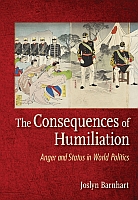The Consequences of Humiliation
Anger and Status in World Politics
Author(s)
Barnhart, Joslyn
Collection
Knowledge Unlatched (KU)Number
104302Language
EnglishAbstract
The Consequences of Humiliation explores the nature of national humiliation and its impact on foreign policy. Joslyn Barnhart demonstrates that Germany's catastrophic reaction to humiliation at the end of World War I is part of a broader pattern: states that experience humiliating events are more likely to engage in international aggression aimed at restoring the state's image in its own eyes and in the eyes of others. Barnhart shows that these states also pursue conquest, intervene in the affairs of other states, engage in diplomatic hostility and verbal discord, and pursue advanced weaponry and other symbols of national resurgence at higher rates than non-humiliated states in similar foreign policy contexts. Her examination of how national humiliation functions at the individual level explores leaders' domestic incentives to evoke a sense of national humiliation. As a result of humiliation on this level, the effects may persist for decades, if not centuries, following the original humiliating event.
Keywords
Political Science; International RelationsDOI
https://doi.org/10.7298/tw6k-t223ISBN
9781501748684Publisher
Cornell University PressPublisher website
https://www.cornellpress.cornell.edu/Publication date and place
2020Grantor
Imprint
Cornell University PressClassification
International relations


 Download
Download